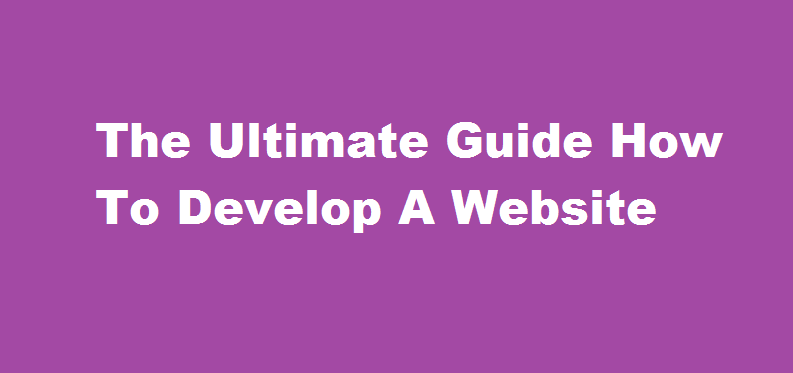The Ultimate Guide How To Develop A Website
3 min read
Introduction
In today’s digital age, having a well-designed and functional website is crucial for individuals and businesses alike. Whether you want to showcase your portfolio, promote your business, or sell products online, a website is a powerful tool. Developing a website may seem daunting, but with the right approach, anyone can create a successful online presence. In this article, we will provide you with a comprehensive guide on how to develop a website, covering everything from planning and design to development and launch.
Planning Your Website
Before diving into the development process, it’s essential to have a clear plan in place. Start by defining the purpose and goals of your website. Identify your target audience, their needs, and how you can meet them effectively. Determine the website’s structure and create a sitemap to organise the pages and content. Additionally, research and analyse your competitors’ websites to gain insights and inspiration for your own.
Design and User Experience
Once you have a solid plan, it’s time to focus on the design and user experience (UX) of your website. Consider the overall visual aesthetics, colour scheme, typography, and layout that align with your brand or personal style. Pay attention to the usability and navigation, ensuring that visitors can easily find what they are looking for. Remember to optimise your website for responsiveness across different devices, making it accessible on desktops, tablets, and mobile phones.
Content Creation and Management
Compelling and relevant content is the backbone of any successful website. Develop engaging and informative content that captivates your audience and reflects your website’s purpose. Create a content strategy that includes regular updates, blog posts, and multimedia elements like images, videos, or infographics. Implement a content management system (CMS) such as WordPress or Drupal to facilitate easy content creation, publishing, and organisation.
Website Development
Website development involves transforming your design and content into a functional website. If you have coding skills, you can develop the website from scratch using languages like HTML, CSS, and JavaScript. Alternatively, you can utilise website builders like Wix, Squarespace, or WordPress, which offer intuitive drag-and-drop interfaces for building websites without coding knowledge. Ensure your website has clear and concise code, optimised for search engines (SEO), and is compatible with multiple browsers.
Testing and Optimization
Thoroughly test your website across various devices and browsers to ensure it works flawlessly. Check for broken links, compatibility issues, and any other errors. Optimise your website’s loading speed, as slow-loading websites can negatively impact user experience. Implement SEO best practices, such as optimising page titles, meta tags, and URLs, to improve your website’s visibility in search engine results.
Launching and Maintenance
Once you’re satisfied with the development and testing, it’s time to launch your website. Purchase a domain name and choose a reliable hosting provider to make your website accessible to users. Regularly update and maintain your website by monitoring its performance, fixing bugs, and regularly backing up your data. Continuously evaluate your website’s analytics to gain insights into user behaviour and make informed improvements over time.
FREQUENTLY ASKED QUESTIONS
What is an FAQ page?
Frequently Asked Questions (FAQ) pages contain a list of commonly asked questions and answers on a website about topics such as hours, shipping and handling, product information, and return policies.
Why should you make an FAQ page?
An FAQ page is a time-saving customer service tactic that provides the most commonly asked questions and answers for current or potential customers.
Conclusion
Developing a website may seem overwhelming at first, but with careful planning, attention to design and user experience, and regular maintenance, you can create a successful online presence. Remember to continuously update and improve your website based on user feedback and changing trends. With dedication and the right approach, your website can become a valuable asset that serves your goals and engages your audience effectively. So, roll up your sleeves, follow this guide, and embark on an exciting journey of website development.
Read Also : Unlocking The Path to Financial Success How to Make Money Online






